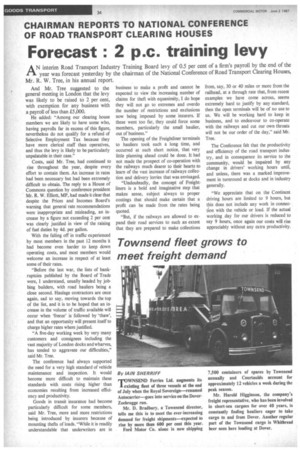Forecast : 2 p.c. training levy
Page 36

If you've noticed an error in this article please click here to report it so we can fix it.
N. interim Road Transport Industry Training Board levy of 0.5 per cent of a firm's payroll by the end of the year was forecast yesterday by the chairman of the National Conference of Road Transport Clearing Houses, Mr. R. W. Tree, in his annual report.
And Mr. Tree suggested to the general meeting in London that the levy was likely to be raised to 2 per cent, with exemption for any business with a payroll of less than £5,000.
He added: "Among our clearing house members we are likely to have some who, having payrolls far in excess of this figure, nevertheless do not qualify for a refund of Selective Employment Tax because they have more clerical staff than operatives, and thus the levy is likely to be particularly unpalatable in their case."
Costs, said Mr. Tree, had continued to rise throughout the year, despite every effort to contain them. An increase in rates had been necessary but had been extremely difficult to obtain. The reply to a House of Commons question by conference president Mr. R. W. Elliott, MP, had made it clear that despite the Prices and Incomes Board's warning that general rate recommendations were inappropriate and misleading, an increase by a figure not exceeding 2 per cent was clearly justified in view of the raising of fuel duties by 4d. per gallon.
With the falling off in traffic experienced by most members in the past 12 months it had become even harder to keep down operating costs, and most members would welcome an increase in respect of at least some of their rates.
"Before the last war, the lists of bankruptcies published by the Board of Trade were, I understand, usually headed by jobbing builders, with road hauliers being a close second. Haulage contractors are once again, sad to say, moving towards the top of the list, and it is to be hoped that an increase in the volume of traffic available will occur when 'freeze' is followed by 'thaw', and that an opportunity will present itself to charge higher rates where justified.
"A five-day working week by very many customers and consignees including the vast majority of London docks and wharves, has tended to aggravate our difficulties," said Mr. Tree.
The conference had always supported the need for a very high standard of vehicle maintenance and inspection. It would become more difficult to maintain these standards with costs rising higher than economies resulting from increased efficiency and productivity.
Goods in transit insurance had become particularly difficult for some members, said Mr. Tree, more and more restrictions being introduced by insurers because of mounting thefts of loads. "While it is readily understandable that underwriters are in business to make a profit and cannot be expected to view the increasing number of claims for theft with equanimity, I do hope they will not go to extremes and overdo the number of restrictions and exclusions now being imposed by some insurers. If these went too far, they could force some members, particularly the small haulier, out of business."
The opening of the Freightliner terminals to hauliers took such a long time, and occurred at such short notice, that very little planning ahead could be done. It had not made the prospect of co-operation with the railways much dearer to their hearts to learn of the vast increase of railways collection and delivery lorries that was envisaged.
"Undoubtedly, the concept of Freightliners is a bold and imaginative step that makes sense, subject always to proper costings that should make certain that a profit can be made from the rates being quoted.
"But, if the railways are allowed to expand their road services to such an extent that they are prepared to make collections from, say, 30 or 40 miles or more from the railhead, at a through rate that, from recent examples we have come across, seems extremely hard to justify by any standard, then the open terminals will be of no use to us. We will be working hard to keep in business, and to endeavour to co-operate with the railways and cut our own throats will not be our order of the day," said Mr. Tree.
The Conference felt that the productivity and efficiency of the road transport industry, and in consequence its service to the community, would be impaired by any change in drivers' working hours until, and unless, there was a marked improvement in turnround at docks and in industry generally.
"We appreciate that on the Continent driving hours are limited to 9 hours, but this does not include any work in connection with the vehicle or load. If the actual working day for our drivers is reduced to say 9 hours, once again our costs will rise appreciably without any extra productivity.




























































































































































